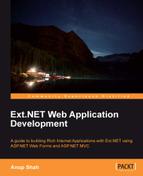Book Description
If you’re looking to build .NET based rich internet applications, look no further. This is the ideal primer that takes you step by step through the practical aspects of combining Ext.NET and Ext JS, and much more.
- Build rich internet applications using the power of Ext.NET controls
- Learn how Ext.NET leverages Sencha’s popular Ext JS JavaScript framework to provide a full client-server web development experience
- Full of examples and tips, with clear step-by-step instructions
In Detail
To build a rich internet application, you need to integrate a powerful client side JavaScript framework with a server side framework. Ext.NET achieves this by integrating Sencha’s Ext JS framework with the power of ASP.NET. The result – a sophisticated framework offering a vast array of controls, layout, and powerful AJAX and server bindings, which can be used to build rich, highly usable web applications.
"Ext.NET Web Application Development" shows you how to build rich applications using Ext.NET. Examples guide you through Ext.NET’s various components using both ASP.NET Web Forms and MVC examples. You will also see how Ext.NET handles data binding and server integration. You will also learn how to create reusable components and put them together in great looking applications.
This book guides you through the various Ext.NET components and capabilities to enable you to create highly usable Ext.NET components and web applications.
You will learn about various UI components and numerous layout options through examples. You will see how the AJAX architecture enables you to create powerful data-oriented applications easily. This book will also teach you how to create reusable custom components to suit your needs.
"Ext.NET Web Application Development" shows you how to create rich and usable applications using Ext.NET through numerous examples.
Table of Contents
- Ext.NET Web Application Development
- Table of Contents
- Ext.NET Web Application Development
- Credits
- About the Author
- About the Reviewers
- www.PacktPub.com
- Preface
- 1. Getting Started with Ext.NET
- An overview of Ext.NET
- Getting Ext.NET
- A walkthrough – creating a simple ASP.NET project with Ext.NET enabled
- A walkthrough – creating a simple ASP.NET MVC Project with Razor and Ext.NET enabled
- Summary
- 2. Ext.NET Controls Overview
- 3. Layout with Ext.NET
- 4. AJAX with Ext.NET
- AJAX with ASP.NET
- DirectEvents
- DirectEvents on Ext.NET Controls
- DirectEvents on ASP.NET Controls
- DirectEvents on HTML Elements
- DirectEvents dynamically generating new Ext.NET Components
- DirectEvents invoking web services
- DirectEvents invoking web services with parameters
- DirectEvents invoking web services that return new Ext.NET components
- DirectEvents invoking generic ASHX handlers
- DirectEvents invoking ASP.NET MVC Controllers
- Best server option? ASMX, ASHX, MVC, ASPX, WCF?
- DirectMethods
- Basic DirectMethod
- Running JavaScript after the DirectMethod is invoked
- Static DirectMethods for best performance
- Returning custom types
- Handling exceptions
- Global AJAX operation handlers
- By-passing the DirectMethod proxy
- DirectMethods calling an ASP.NET MVC Controller
- DirectMethods calling web services
- DirectMethods calling generic ASHX handlers
- DirectMethods on user controls
- DirectMethods on ASP.NET MVC Controllers
- Turning off the ID mode for DirectMethods
- Controlling the rendering of dynamically generated controls
- AJAX options specific to certain controls
- Ultimate performance option: avoid AJAX!
- Summary
- 5. Working with Data
- 6. Introducing GridPanels
- 7. Forms and Validation
- 8. Trees and Tabs with Ext.NET
- 9. Extending Ext.NET – Custom Controls and Plugins
- Basic control builder
- Extending Ext.NET controls
- Extending the Ext.NET class
- Extending the Ext JS class
- Embedding the resources
- Custom events
- Passing properties to your JavaScript class
- Using the custom component on an ASP.NET Web Form
- Using your custom component in ASP.NET MVC (Razor)
- Recap of steps to create a custom component
- Component design considerations
- Benefits of extending Ext.NET controls
- Drawbacks of this approach
- Using plugins
- Plugins versus extending components
- Summary
- 10. Troubleshooting and Debugging
- Index
